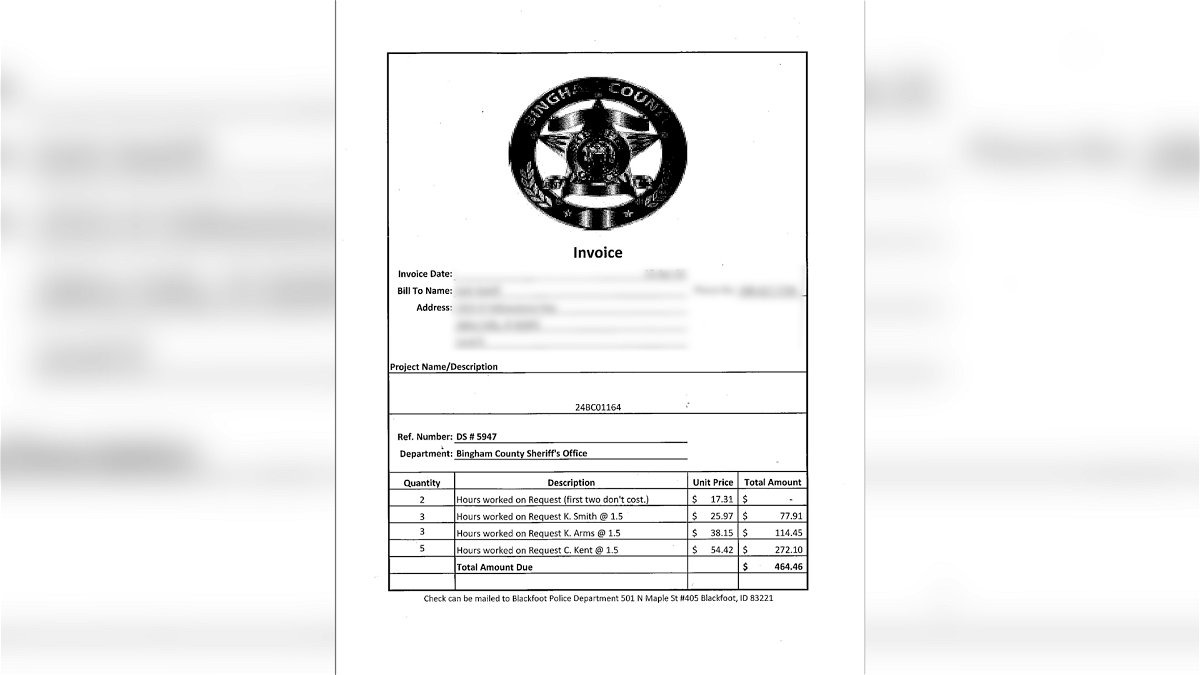Local News 8 getting answers: The financial cost of accessing public records
BINGHAM COUNTY, Idaho (KIFI) - Last month, we reported on a home invasion in Bingham County, Local news 8 was the first on the scene and led the coverage.
Since then we've talked one-on-one with the county prosecutor and submitted a public records request for case materials. That is where we hit a roadblock.
Our reporters were informed beforehand of the fees involved with a records request, but imagine our surprise when we received a letter containing an invoice for $435 for those records.

The entire invoice details fees based on hours worked on the request.
According to the Bingham County sheriff's records office, part of that bill goes towards paying for a third party company to redact parts of police body cam footage. The other part does go towards paying for the records office to redact information for public release.
In the Gem State, Idaho Statute 74 allows law enforcement and other government and public agencies to charge fees covering; the actual cost of the records, copies and staff time.
We spoke with another local news organization that paid for the documents, which led us to ask the records department why each individual party had to pay for the same work.
Our reporter was told by the records office, "We've been given the okay to pretty much release the entire case. So it's a lot of work. and it does have to be checked and double checked in. Protecting the victims and their information is very important. So it's something that kind of has to be gone through with the fine tooth comb."
In all fairness the records department is sifting through a lot of information, according to the person we spoke to they're preparing over 600 photos for release.
But this leads us to ask, why does the law require people requesting information to pay for hours taxpayers are already paying for?
After a short investigation, we found the Freedom of Information Act does allow for this.
However, there are notable exceptions to the fees in the Gem state, for example; if the information is in the public interest or if the party can't pay.
Idaho Statute Title 74 (f) says "The public agency shall not charge any cost or fee for copies or labor when the requester demonstrates that the requester’s examination and/or copying of public records:"
"(i) Is likely to contribute significantly to the public’s understanding of the operations or activities of the government;"
"(ii) Is not primarily in the individual interest of the requester including, but not limited to, the requester’s interest in litigation in which the requester is or may become a party; and"
"(iii) Will not occur if fees are charged because the requester has insufficient financial resources to pay such fees."
Advocates for open government across the nation have said the fees can undermine the transparency of law enforcement and government agencies.
According to Idaho Press Club representative, Scott McIntosh, there's a fine line agencies need to walk between recouping taxpayer dollars and limiting access to important information.
"We understand that there is a desire to recoup costs of paying a lawyer to go through a document and redact information," said McIntosh. "Particularly with police agencies and law enforcement agencies, there's a lot of information on public records that are sensitive in nature identifying information that really are exempt from the public records law."
However the Press Club has found when agencies charge an "exorbitant amount" for a release, the information is effectively "shielded from the public view."
According to McIntosh, those situations leave news media groups with few options.
"The only recourse we have as the media and as the public is to sue the agency," said McIntosh.
In most cases, McIntosh says this can lead to both parties paying "exorbitant" amounts of money. He says it's more effective for public and law enforcement agencies to waive the fees in cases of public interest.
"The city of Boise has come around to our thinking, and they have now agreed to release critical incident task force reports to the public," said McIntosh. "(They recognize) that, yes, the taxpayer is bearing the cost of redacting that information, but it is the public that benefits from the release of this public information."
Local News 8 plans to continue to dig into this and see how much records requests cost in counties across Eastern Idaho.
